Hospitality Business Strategy Report: Howard Johnson Case Study
VerifiedAdded on 2023/01/11
|11
|3831
|35
Report
AI Summary
This report provides a comprehensive analysis of hospitality business strategy, using Howard Johnson as a case study. It begins by examining the macro environment, including political, economic, social, technological, environmental, and legal factors (PESTEL analysis) and their impact on the industry. The report then evaluates the internal environment, employing SWOT and VRIO analyses to assess the company's strengths, weaknesses, opportunities, and threats, as well as its resources and capabilities. Furthermore, the report applies Porter's Five Forces model to analyze the competitive landscape of the hospitality industry. Finally, it explores various theories and concepts relevant to strategic planning within the organization. The analysis highlights the importance of adapting to external factors and leveraging internal strengths to achieve competitive advantage in the dynamic hospitality market.
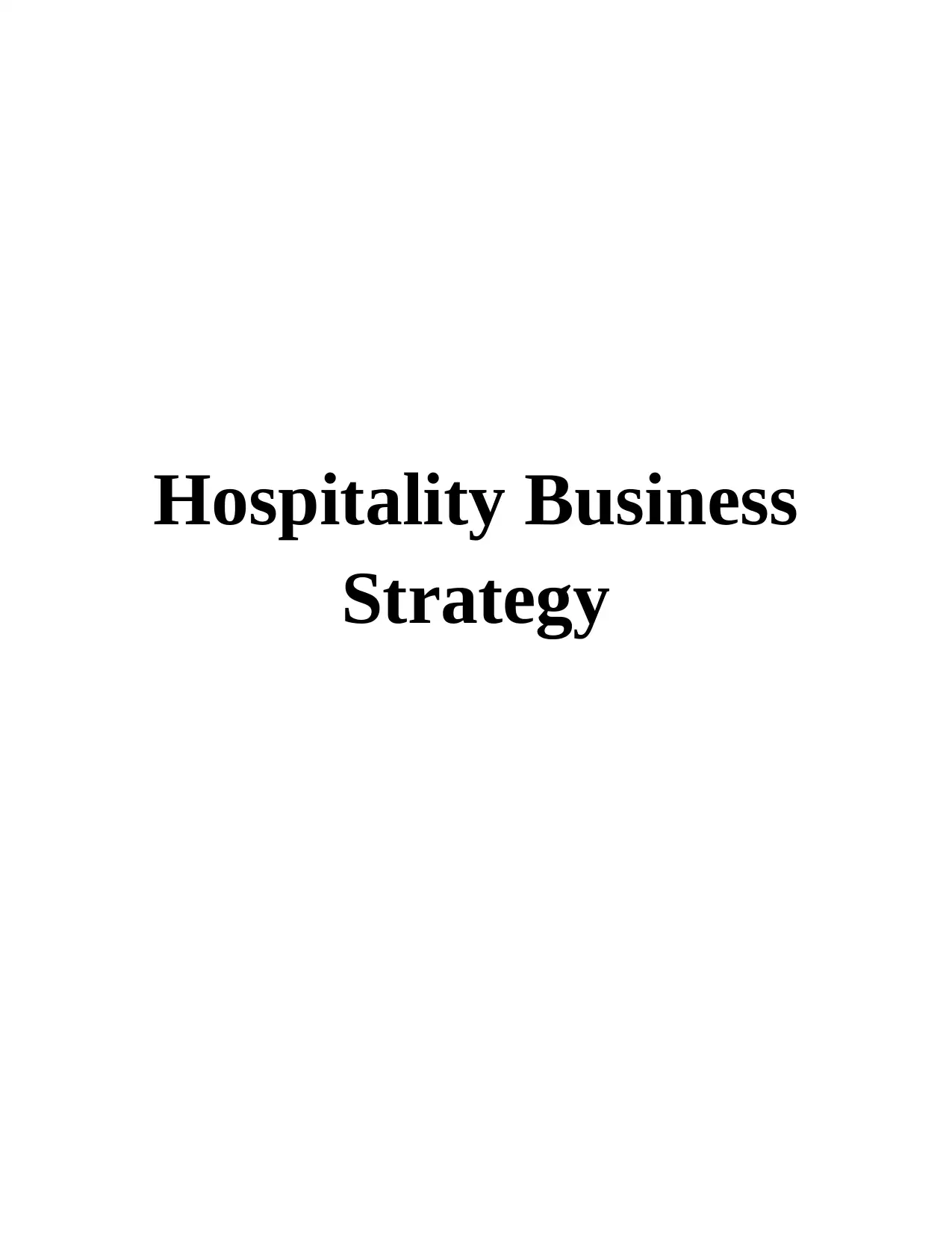
Hospitality Business
Strategy
Strategy
Paraphrase This Document
Need a fresh take? Get an instant paraphrase of this document with our AI Paraphraser
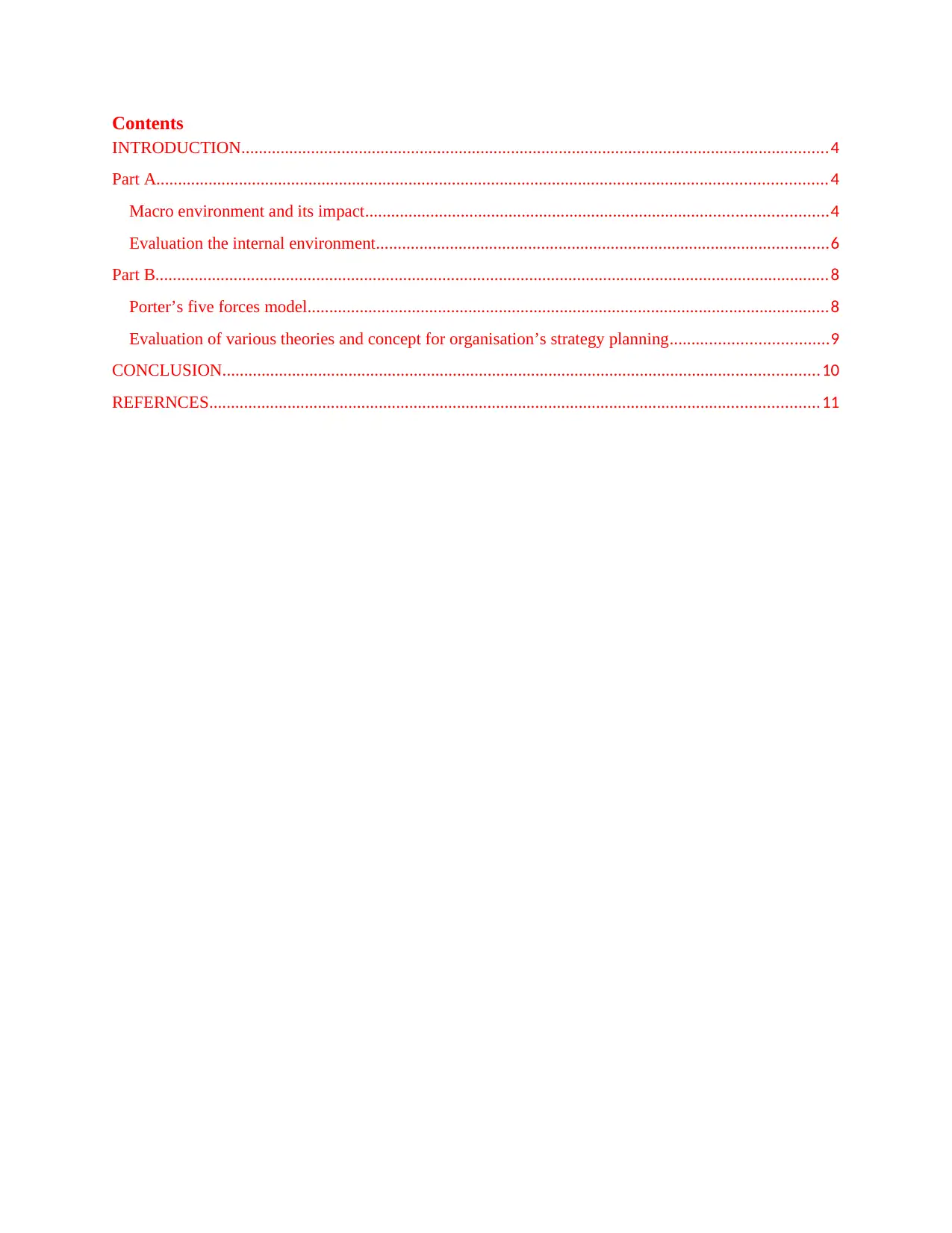
Contents
INTRODUCTION.......................................................................................................................................4
Part A..........................................................................................................................................................4
Macro environment and its impact..........................................................................................................4
Evaluation the internal environment........................................................................................................6
Part B...........................................................................................................................................................8
Porter’s five forces model........................................................................................................................8
Evaluation of various theories and concept for organisation’s strategy planning....................................9
CONCLUSION.........................................................................................................................................10
REFERNCES............................................................................................................................................11
INTRODUCTION.......................................................................................................................................4
Part A..........................................................................................................................................................4
Macro environment and its impact..........................................................................................................4
Evaluation the internal environment........................................................................................................6
Part B...........................................................................................................................................................8
Porter’s five forces model........................................................................................................................8
Evaluation of various theories and concept for organisation’s strategy planning....................................9
CONCLUSION.........................................................................................................................................10
REFERNCES............................................................................................................................................11
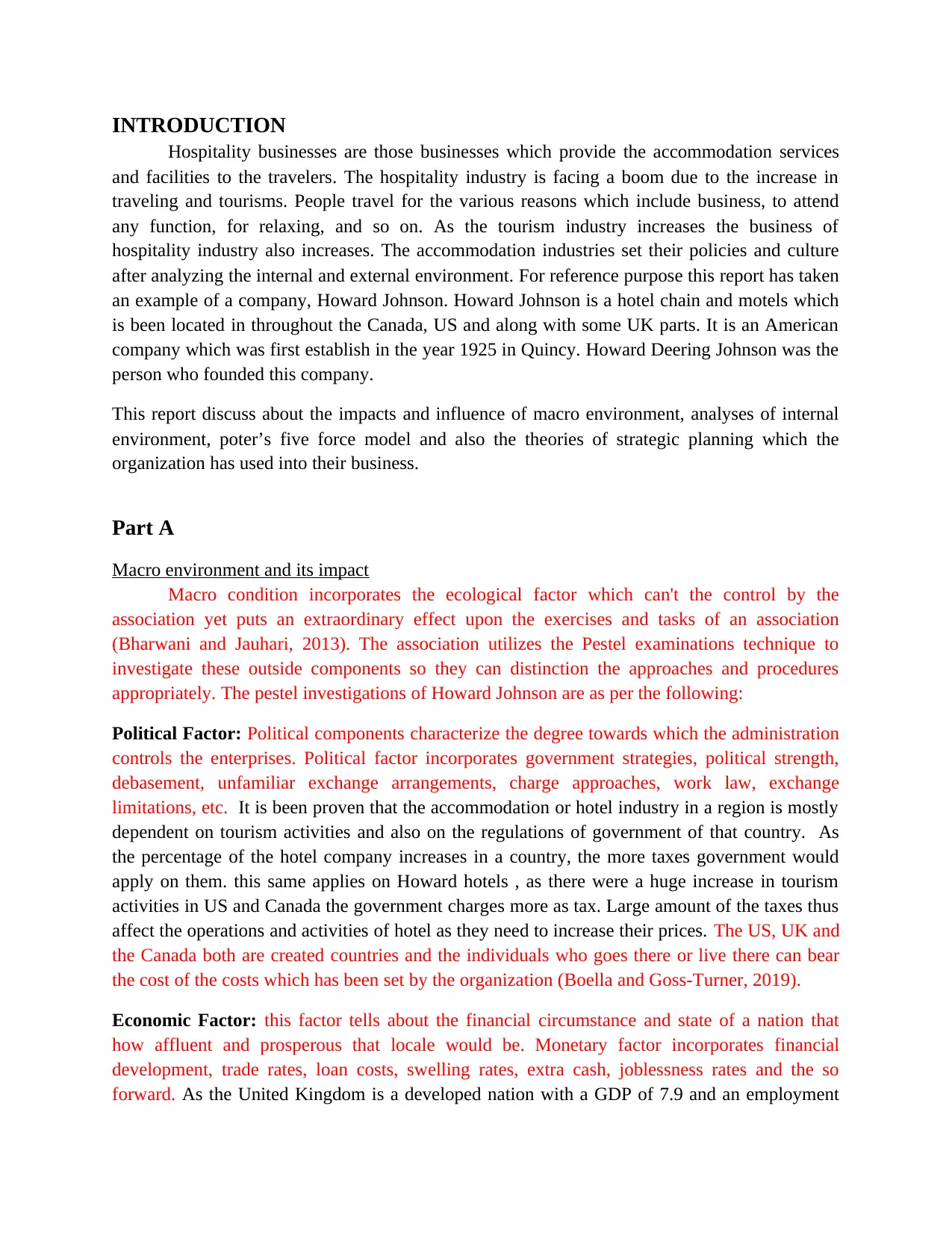
INTRODUCTION
Hospitality businesses are those businesses which provide the accommodation services
and facilities to the travelers. The hospitality industry is facing a boom due to the increase in
traveling and tourisms. People travel for the various reasons which include business, to attend
any function, for relaxing, and so on. As the tourism industry increases the business of
hospitality industry also increases. The accommodation industries set their policies and culture
after analyzing the internal and external environment. For reference purpose this report has taken
an example of a company, Howard Johnson. Howard Johnson is a hotel chain and motels which
is been located in throughout the Canada, US and along with some UK parts. It is an American
company which was first establish in the year 1925 in Quincy. Howard Deering Johnson was the
person who founded this company.
This report discuss about the impacts and influence of macro environment, analyses of internal
environment, poter’s five force model and also the theories of strategic planning which the
organization has used into their business.
Part A
Macro environment and its impact
Macro condition incorporates the ecological factor which can't the control by the
association yet puts an extraordinary effect upon the exercises and tasks of an association
(Bharwani and Jauhari, 2013). The association utilizes the Pestel examinations technique to
investigate these outside components so they can distinction the approaches and procedures
appropriately. The pestel investigations of Howard Johnson are as per the following:
Political Factor: Political components characterize the degree towards which the administration
controls the enterprises. Political factor incorporates government strategies, political strength,
debasement, unfamiliar exchange arrangements, charge approaches, work law, exchange
limitations, etc. It is been proven that the accommodation or hotel industry in a region is mostly
dependent on tourism activities and also on the regulations of government of that country. As
the percentage of the hotel company increases in a country, the more taxes government would
apply on them. this same applies on Howard hotels , as there were a huge increase in tourism
activities in US and Canada the government charges more as tax. Large amount of the taxes thus
affect the operations and activities of hotel as they need to increase their prices. The US, UK and
the Canada both are created countries and the individuals who goes there or live there can bear
the cost of the costs which has been set by the organization (Boella and Goss-Turner, 2019).
Economic Factor: this factor tells about the financial circumstance and state of a nation that
how affluent and prosperous that locale would be. Monetary factor incorporates financial
development, trade rates, loan costs, swelling rates, extra cash, joblessness rates and the so
forward. As the United Kingdom is a developed nation with a GDP of 7.9 and an employment
Hospitality businesses are those businesses which provide the accommodation services
and facilities to the travelers. The hospitality industry is facing a boom due to the increase in
traveling and tourisms. People travel for the various reasons which include business, to attend
any function, for relaxing, and so on. As the tourism industry increases the business of
hospitality industry also increases. The accommodation industries set their policies and culture
after analyzing the internal and external environment. For reference purpose this report has taken
an example of a company, Howard Johnson. Howard Johnson is a hotel chain and motels which
is been located in throughout the Canada, US and along with some UK parts. It is an American
company which was first establish in the year 1925 in Quincy. Howard Deering Johnson was the
person who founded this company.
This report discuss about the impacts and influence of macro environment, analyses of internal
environment, poter’s five force model and also the theories of strategic planning which the
organization has used into their business.
Part A
Macro environment and its impact
Macro condition incorporates the ecological factor which can't the control by the
association yet puts an extraordinary effect upon the exercises and tasks of an association
(Bharwani and Jauhari, 2013). The association utilizes the Pestel examinations technique to
investigate these outside components so they can distinction the approaches and procedures
appropriately. The pestel investigations of Howard Johnson are as per the following:
Political Factor: Political components characterize the degree towards which the administration
controls the enterprises. Political factor incorporates government strategies, political strength,
debasement, unfamiliar exchange arrangements, charge approaches, work law, exchange
limitations, etc. It is been proven that the accommodation or hotel industry in a region is mostly
dependent on tourism activities and also on the regulations of government of that country. As
the percentage of the hotel company increases in a country, the more taxes government would
apply on them. this same applies on Howard hotels , as there were a huge increase in tourism
activities in US and Canada the government charges more as tax. Large amount of the taxes thus
affect the operations and activities of hotel as they need to increase their prices. The US, UK and
the Canada both are created countries and the individuals who goes there or live there can bear
the cost of the costs which has been set by the organization (Boella and Goss-Turner, 2019).
Economic Factor: this factor tells about the financial circumstance and state of a nation that
how affluent and prosperous that locale would be. Monetary factor incorporates financial
development, trade rates, loan costs, swelling rates, extra cash, joblessness rates and the so
forward. As the United Kingdom is a developed nation with a GDP of 7.9 and an employment
⊘ This is a preview!⊘
Do you want full access?
Subscribe today to unlock all pages.

Trusted by 1+ million students worldwide
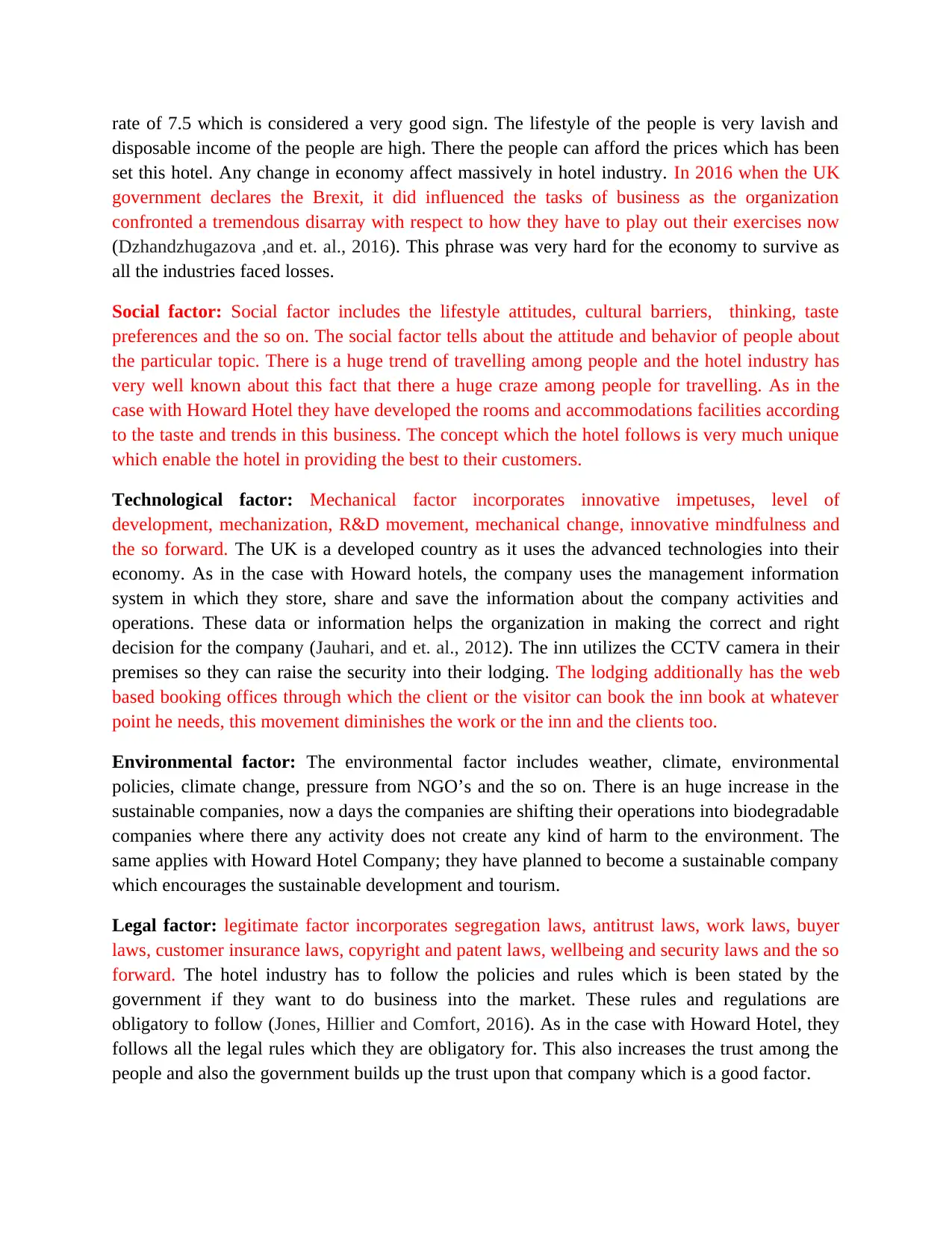
rate of 7.5 which is considered a very good sign. The lifestyle of the people is very lavish and
disposable income of the people are high. There the people can afford the prices which has been
set this hotel. Any change in economy affect massively in hotel industry. In 2016 when the UK
government declares the Brexit, it did influenced the tasks of business as the organization
confronted a tremendous disarray with respect to how they have to play out their exercises now
(Dzhandzhugazova ,and et. al., 2016). This phrase was very hard for the economy to survive as
all the industries faced losses.
Social factor: Social factor includes the lifestyle attitudes, cultural barriers, thinking, taste
preferences and the so on. The social factor tells about the attitude and behavior of people about
the particular topic. There is a huge trend of travelling among people and the hotel industry has
very well known about this fact that there a huge craze among people for travelling. As in the
case with Howard Hotel they have developed the rooms and accommodations facilities according
to the taste and trends in this business. The concept which the hotel follows is very much unique
which enable the hotel in providing the best to their customers.
Technological factor: Mechanical factor incorporates innovative impetuses, level of
development, mechanization, R&D movement, mechanical change, innovative mindfulness and
the so forward. The UK is a developed country as it uses the advanced technologies into their
economy. As in the case with Howard hotels, the company uses the management information
system in which they store, share and save the information about the company activities and
operations. These data or information helps the organization in making the correct and right
decision for the company (Jauhari, and et. al., 2012). The inn utilizes the CCTV camera in their
premises so they can raise the security into their lodging. The lodging additionally has the web
based booking offices through which the client or the visitor can book the inn book at whatever
point he needs, this movement diminishes the work or the inn and the clients too.
Environmental factor: The environmental factor includes weather, climate, environmental
policies, climate change, pressure from NGO’s and the so on. There is an huge increase in the
sustainable companies, now a days the companies are shifting their operations into biodegradable
companies where there any activity does not create any kind of harm to the environment. The
same applies with Howard Hotel Company; they have planned to become a sustainable company
which encourages the sustainable development and tourism.
Legal factor: legitimate factor incorporates segregation laws, antitrust laws, work laws, buyer
laws, customer insurance laws, copyright and patent laws, wellbeing and security laws and the so
forward. The hotel industry has to follow the policies and rules which is been stated by the
government if they want to do business into the market. These rules and regulations are
obligatory to follow (Jones, Hillier and Comfort, 2016). As in the case with Howard Hotel, they
follows all the legal rules which they are obligatory for. This also increases the trust among the
people and also the government builds up the trust upon that company which is a good factor.
disposable income of the people are high. There the people can afford the prices which has been
set this hotel. Any change in economy affect massively in hotel industry. In 2016 when the UK
government declares the Brexit, it did influenced the tasks of business as the organization
confronted a tremendous disarray with respect to how they have to play out their exercises now
(Dzhandzhugazova ,and et. al., 2016). This phrase was very hard for the economy to survive as
all the industries faced losses.
Social factor: Social factor includes the lifestyle attitudes, cultural barriers, thinking, taste
preferences and the so on. The social factor tells about the attitude and behavior of people about
the particular topic. There is a huge trend of travelling among people and the hotel industry has
very well known about this fact that there a huge craze among people for travelling. As in the
case with Howard Hotel they have developed the rooms and accommodations facilities according
to the taste and trends in this business. The concept which the hotel follows is very much unique
which enable the hotel in providing the best to their customers.
Technological factor: Mechanical factor incorporates innovative impetuses, level of
development, mechanization, R&D movement, mechanical change, innovative mindfulness and
the so forward. The UK is a developed country as it uses the advanced technologies into their
economy. As in the case with Howard hotels, the company uses the management information
system in which they store, share and save the information about the company activities and
operations. These data or information helps the organization in making the correct and right
decision for the company (Jauhari, and et. al., 2012). The inn utilizes the CCTV camera in their
premises so they can raise the security into their lodging. The lodging additionally has the web
based booking offices through which the client or the visitor can book the inn book at whatever
point he needs, this movement diminishes the work or the inn and the clients too.
Environmental factor: The environmental factor includes weather, climate, environmental
policies, climate change, pressure from NGO’s and the so on. There is an huge increase in the
sustainable companies, now a days the companies are shifting their operations into biodegradable
companies where there any activity does not create any kind of harm to the environment. The
same applies with Howard Hotel Company; they have planned to become a sustainable company
which encourages the sustainable development and tourism.
Legal factor: legitimate factor incorporates segregation laws, antitrust laws, work laws, buyer
laws, customer insurance laws, copyright and patent laws, wellbeing and security laws and the so
forward. The hotel industry has to follow the policies and rules which is been stated by the
government if they want to do business into the market. These rules and regulations are
obligatory to follow (Jones, Hillier and Comfort, 2016). As in the case with Howard Hotel, they
follows all the legal rules which they are obligatory for. This also increases the trust among the
people and also the government builds up the trust upon that company which is a good factor.
Paraphrase This Document
Need a fresh take? Get an instant paraphrase of this document with our AI Paraphraser
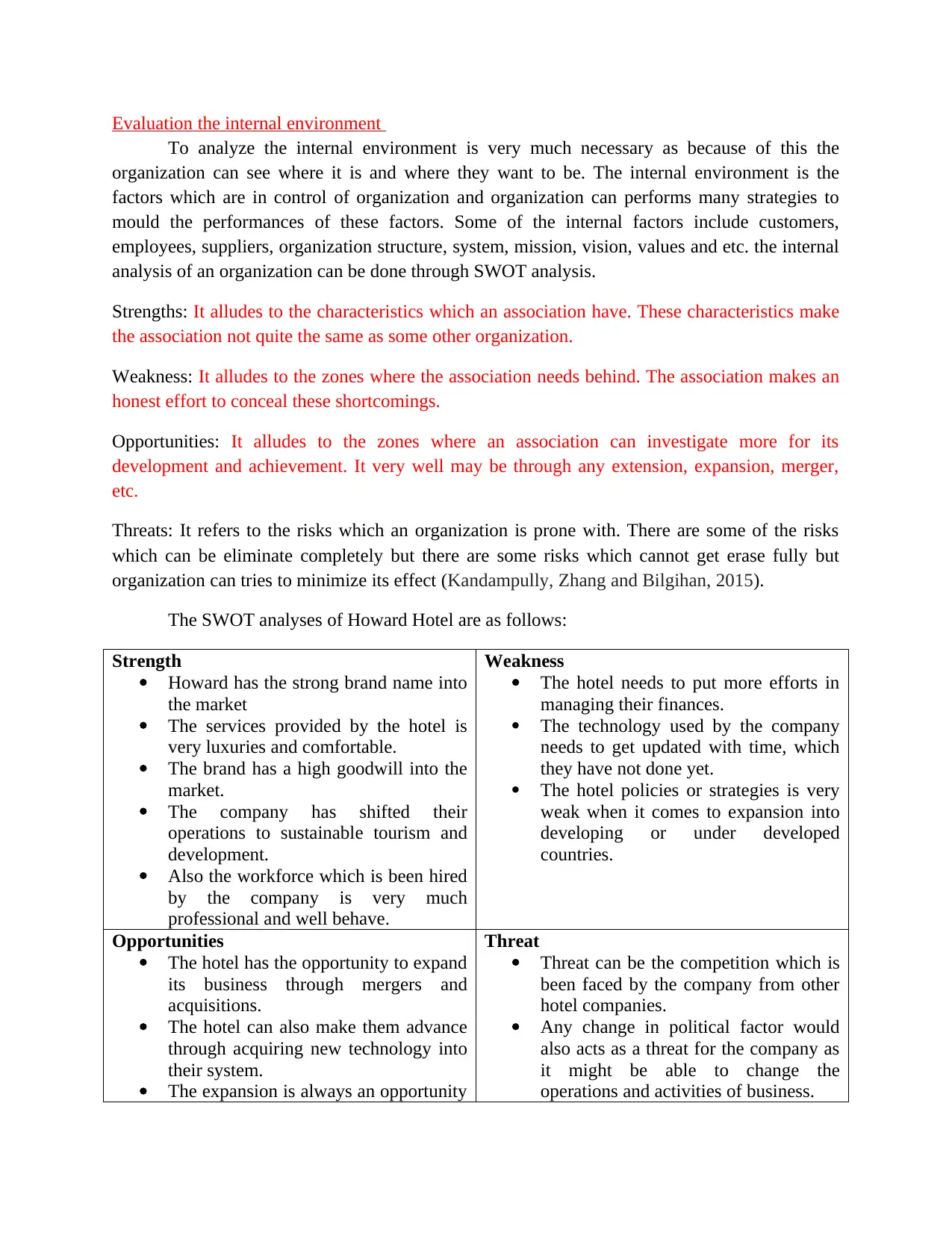
Evaluation the internal environment
To analyze the internal environment is very much necessary as because of this the
organization can see where it is and where they want to be. The internal environment is the
factors which are in control of organization and organization can performs many strategies to
mould the performances of these factors. Some of the internal factors include customers,
employees, suppliers, organization structure, system, mission, vision, values and etc. the internal
analysis of an organization can be done through SWOT analysis.
Strengths: It alludes to the characteristics which an association have. These characteristics make
the association not quite the same as some other organization.
Weakness: It alludes to the zones where the association needs behind. The association makes an
honest effort to conceal these shortcomings.
Opportunities: It alludes to the zones where an association can investigate more for its
development and achievement. It very well may be through any extension, expansion, merger,
etc.
Threats: It refers to the risks which an organization is prone with. There are some of the risks
which can be eliminate completely but there are some risks which cannot get erase fully but
organization can tries to minimize its effect (Kandampully, Zhang and Bilgihan, 2015).
The SWOT analyses of Howard Hotel are as follows:
Strength
Howard has the strong brand name into
the market
The services provided by the hotel is
very luxuries and comfortable.
The brand has a high goodwill into the
market.
The company has shifted their
operations to sustainable tourism and
development.
Also the workforce which is been hired
by the company is very much
professional and well behave.
Weakness
The hotel needs to put more efforts in
managing their finances.
The technology used by the company
needs to get updated with time, which
they have not done yet.
The hotel policies or strategies is very
weak when it comes to expansion into
developing or under developed
countries.
Opportunities
The hotel has the opportunity to expand
its business through mergers and
acquisitions.
The hotel can also make them advance
through acquiring new technology into
their system.
The expansion is always an opportunity
Threat
Threat can be the competition which is
been faced by the company from other
hotel companies.
Any change in political factor would
also acts as a threat for the company as
it might be able to change the
operations and activities of business.
To analyze the internal environment is very much necessary as because of this the
organization can see where it is and where they want to be. The internal environment is the
factors which are in control of organization and organization can performs many strategies to
mould the performances of these factors. Some of the internal factors include customers,
employees, suppliers, organization structure, system, mission, vision, values and etc. the internal
analysis of an organization can be done through SWOT analysis.
Strengths: It alludes to the characteristics which an association have. These characteristics make
the association not quite the same as some other organization.
Weakness: It alludes to the zones where the association needs behind. The association makes an
honest effort to conceal these shortcomings.
Opportunities: It alludes to the zones where an association can investigate more for its
development and achievement. It very well may be through any extension, expansion, merger,
etc.
Threats: It refers to the risks which an organization is prone with. There are some of the risks
which can be eliminate completely but there are some risks which cannot get erase fully but
organization can tries to minimize its effect (Kandampully, Zhang and Bilgihan, 2015).
The SWOT analyses of Howard Hotel are as follows:
Strength
Howard has the strong brand name into
the market
The services provided by the hotel is
very luxuries and comfortable.
The brand has a high goodwill into the
market.
The company has shifted their
operations to sustainable tourism and
development.
Also the workforce which is been hired
by the company is very much
professional and well behave.
Weakness
The hotel needs to put more efforts in
managing their finances.
The technology used by the company
needs to get updated with time, which
they have not done yet.
The hotel policies or strategies is very
weak when it comes to expansion into
developing or under developed
countries.
Opportunities
The hotel has the opportunity to expand
its business through mergers and
acquisitions.
The hotel can also make them advance
through acquiring new technology into
their system.
The expansion is always an opportunity
Threat
Threat can be the competition which is
been faced by the company from other
hotel companies.
Any change in political factor would
also acts as a threat for the company as
it might be able to change the
operations and activities of business.
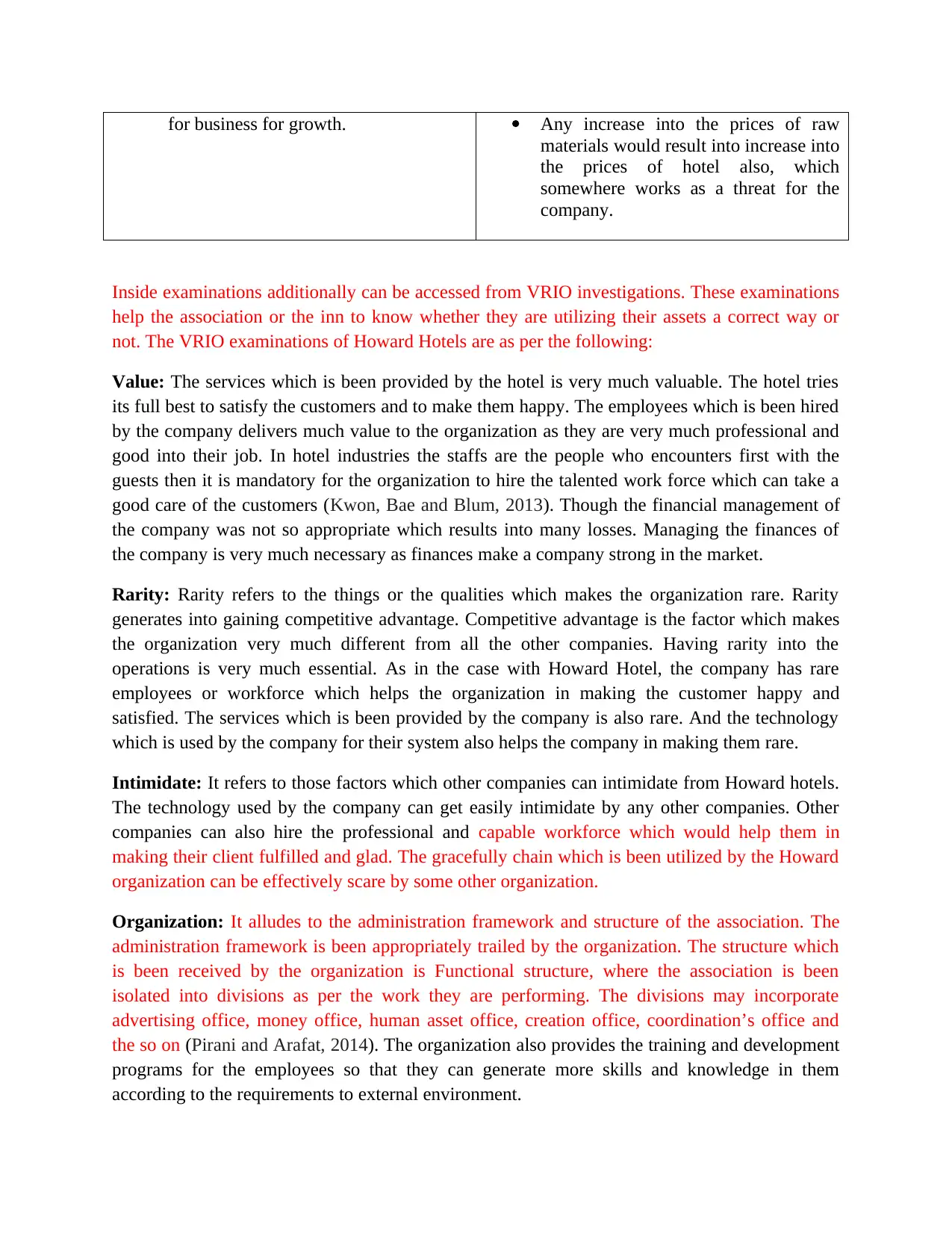
for business for growth. Any increase into the prices of raw
materials would result into increase into
the prices of hotel also, which
somewhere works as a threat for the
company.
Inside examinations additionally can be accessed from VRIO investigations. These examinations
help the association or the inn to know whether they are utilizing their assets a correct way or
not. The VRIO examinations of Howard Hotels are as per the following:
Value: The services which is been provided by the hotel is very much valuable. The hotel tries
its full best to satisfy the customers and to make them happy. The employees which is been hired
by the company delivers much value to the organization as they are very much professional and
good into their job. In hotel industries the staffs are the people who encounters first with the
guests then it is mandatory for the organization to hire the talented work force which can take a
good care of the customers (Kwon, Bae and Blum, 2013). Though the financial management of
the company was not so appropriate which results into many losses. Managing the finances of
the company is very much necessary as finances make a company strong in the market.
Rarity: Rarity refers to the things or the qualities which makes the organization rare. Rarity
generates into gaining competitive advantage. Competitive advantage is the factor which makes
the organization very much different from all the other companies. Having rarity into the
operations is very much essential. As in the case with Howard Hotel, the company has rare
employees or workforce which helps the organization in making the customer happy and
satisfied. The services which is been provided by the company is also rare. And the technology
which is used by the company for their system also helps the company in making them rare.
Intimidate: It refers to those factors which other companies can intimidate from Howard hotels.
The technology used by the company can get easily intimidate by any other companies. Other
companies can also hire the professional and capable workforce which would help them in
making their client fulfilled and glad. The gracefully chain which is been utilized by the Howard
organization can be effectively scare by some other organization.
Organization: It alludes to the administration framework and structure of the association. The
administration framework is been appropriately trailed by the organization. The structure which
is been received by the organization is Functional structure, where the association is been
isolated into divisions as per the work they are performing. The divisions may incorporate
advertising office, money office, human asset office, creation office, coordination’s office and
the so on (Pirani and Arafat, 2014). The organization also provides the training and development
programs for the employees so that they can generate more skills and knowledge in them
according to the requirements to external environment.
materials would result into increase into
the prices of hotel also, which
somewhere works as a threat for the
company.
Inside examinations additionally can be accessed from VRIO investigations. These examinations
help the association or the inn to know whether they are utilizing their assets a correct way or
not. The VRIO examinations of Howard Hotels are as per the following:
Value: The services which is been provided by the hotel is very much valuable. The hotel tries
its full best to satisfy the customers and to make them happy. The employees which is been hired
by the company delivers much value to the organization as they are very much professional and
good into their job. In hotel industries the staffs are the people who encounters first with the
guests then it is mandatory for the organization to hire the talented work force which can take a
good care of the customers (Kwon, Bae and Blum, 2013). Though the financial management of
the company was not so appropriate which results into many losses. Managing the finances of
the company is very much necessary as finances make a company strong in the market.
Rarity: Rarity refers to the things or the qualities which makes the organization rare. Rarity
generates into gaining competitive advantage. Competitive advantage is the factor which makes
the organization very much different from all the other companies. Having rarity into the
operations is very much essential. As in the case with Howard Hotel, the company has rare
employees or workforce which helps the organization in making the customer happy and
satisfied. The services which is been provided by the company is also rare. And the technology
which is used by the company for their system also helps the company in making them rare.
Intimidate: It refers to those factors which other companies can intimidate from Howard hotels.
The technology used by the company can get easily intimidate by any other companies. Other
companies can also hire the professional and capable workforce which would help them in
making their client fulfilled and glad. The gracefully chain which is been utilized by the Howard
organization can be effectively scare by some other organization.
Organization: It alludes to the administration framework and structure of the association. The
administration framework is been appropriately trailed by the organization. The structure which
is been received by the organization is Functional structure, where the association is been
isolated into divisions as per the work they are performing. The divisions may incorporate
advertising office, money office, human asset office, creation office, coordination’s office and
the so on (Pirani and Arafat, 2014). The organization also provides the training and development
programs for the employees so that they can generate more skills and knowledge in them
according to the requirements to external environment.
⊘ This is a preview!⊘
Do you want full access?
Subscribe today to unlock all pages.

Trusted by 1+ million students worldwide
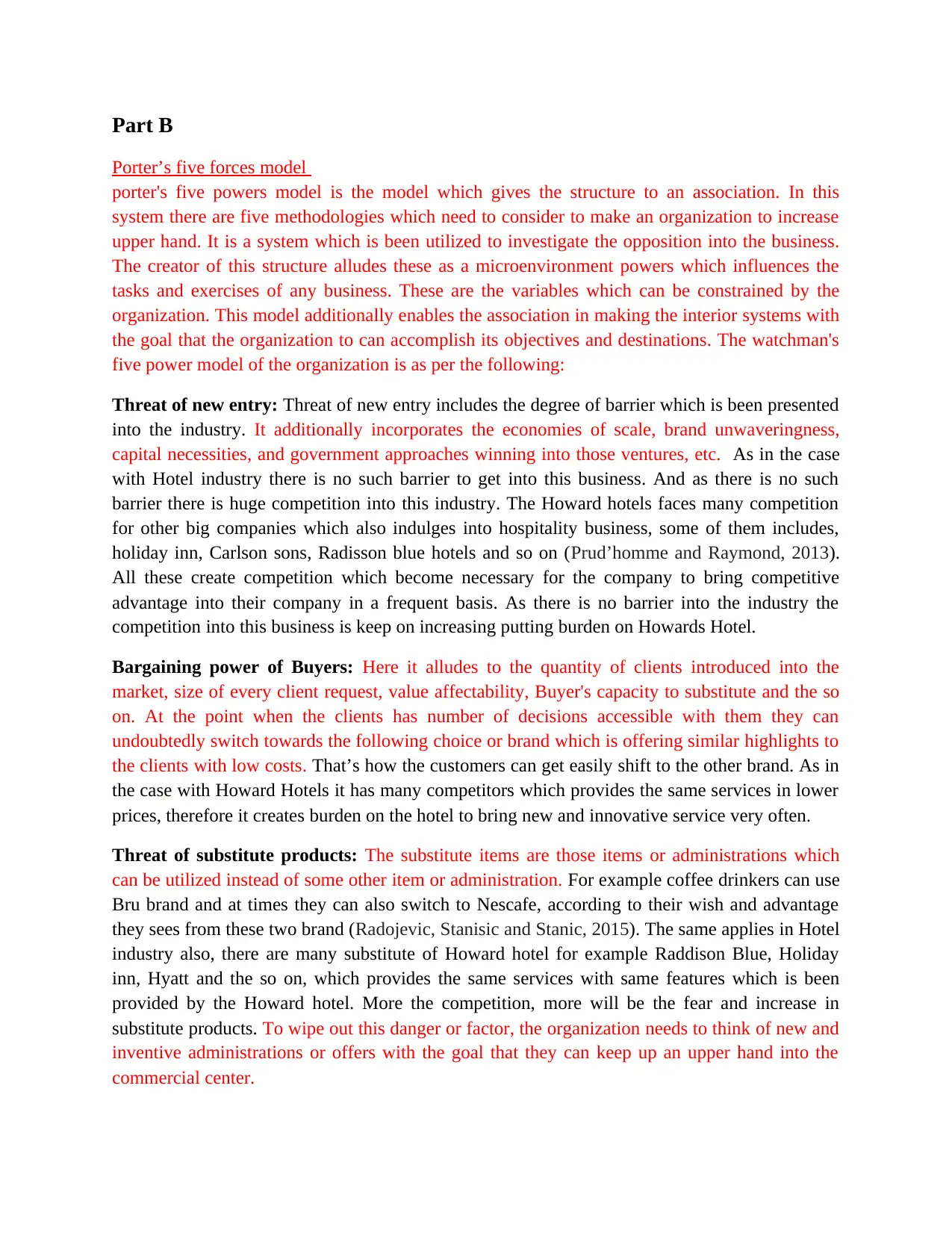
Part B
Porter’s five forces model
porter's five powers model is the model which gives the structure to an association. In this
system there are five methodologies which need to consider to make an organization to increase
upper hand. It is a system which is been utilized to investigate the opposition into the business.
The creator of this structure alludes these as a microenvironment powers which influences the
tasks and exercises of any business. These are the variables which can be constrained by the
organization. This model additionally enables the association in making the interior systems with
the goal that the organization to can accomplish its objectives and destinations. The watchman's
five power model of the organization is as per the following:
Threat of new entry: Threat of new entry includes the degree of barrier which is been presented
into the industry. It additionally incorporates the economies of scale, brand unwaveringness,
capital necessities, and government approaches winning into those ventures, etc. As in the case
with Hotel industry there is no such barrier to get into this business. And as there is no such
barrier there is huge competition into this industry. The Howard hotels faces many competition
for other big companies which also indulges into hospitality business, some of them includes,
holiday inn, Carlson sons, Radisson blue hotels and so on (Prud’homme and Raymond, 2013).
All these create competition which become necessary for the company to bring competitive
advantage into their company in a frequent basis. As there is no barrier into the industry the
competition into this business is keep on increasing putting burden on Howards Hotel.
Bargaining power of Buyers: Here it alludes to the quantity of clients introduced into the
market, size of every client request, value affectability, Buyer's capacity to substitute and the so
on. At the point when the clients has number of decisions accessible with them they can
undoubtedly switch towards the following choice or brand which is offering similar highlights to
the clients with low costs. That’s how the customers can get easily shift to the other brand. As in
the case with Howard Hotels it has many competitors which provides the same services in lower
prices, therefore it creates burden on the hotel to bring new and innovative service very often.
Threat of substitute products: The substitute items are those items or administrations which
can be utilized instead of some other item or administration. For example coffee drinkers can use
Bru brand and at times they can also switch to Nescafe, according to their wish and advantage
they sees from these two brand (Radojevic, Stanisic and Stanic, 2015). The same applies in Hotel
industry also, there are many substitute of Howard hotel for example Raddison Blue, Holiday
inn, Hyatt and the so on, which provides the same services with same features which is been
provided by the Howard hotel. More the competition, more will be the fear and increase in
substitute products. To wipe out this danger or factor, the organization needs to think of new and
inventive administrations or offers with the goal that they can keep up an upper hand into the
commercial center.
Porter’s five forces model
porter's five powers model is the model which gives the structure to an association. In this
system there are five methodologies which need to consider to make an organization to increase
upper hand. It is a system which is been utilized to investigate the opposition into the business.
The creator of this structure alludes these as a microenvironment powers which influences the
tasks and exercises of any business. These are the variables which can be constrained by the
organization. This model additionally enables the association in making the interior systems with
the goal that the organization to can accomplish its objectives and destinations. The watchman's
five power model of the organization is as per the following:
Threat of new entry: Threat of new entry includes the degree of barrier which is been presented
into the industry. It additionally incorporates the economies of scale, brand unwaveringness,
capital necessities, and government approaches winning into those ventures, etc. As in the case
with Hotel industry there is no such barrier to get into this business. And as there is no such
barrier there is huge competition into this industry. The Howard hotels faces many competition
for other big companies which also indulges into hospitality business, some of them includes,
holiday inn, Carlson sons, Radisson blue hotels and so on (Prud’homme and Raymond, 2013).
All these create competition which become necessary for the company to bring competitive
advantage into their company in a frequent basis. As there is no barrier into the industry the
competition into this business is keep on increasing putting burden on Howards Hotel.
Bargaining power of Buyers: Here it alludes to the quantity of clients introduced into the
market, size of every client request, value affectability, Buyer's capacity to substitute and the so
on. At the point when the clients has number of decisions accessible with them they can
undoubtedly switch towards the following choice or brand which is offering similar highlights to
the clients with low costs. That’s how the customers can get easily shift to the other brand. As in
the case with Howard Hotels it has many competitors which provides the same services in lower
prices, therefore it creates burden on the hotel to bring new and innovative service very often.
Threat of substitute products: The substitute items are those items or administrations which
can be utilized instead of some other item or administration. For example coffee drinkers can use
Bru brand and at times they can also switch to Nescafe, according to their wish and advantage
they sees from these two brand (Radojevic, Stanisic and Stanic, 2015). The same applies in Hotel
industry also, there are many substitute of Howard hotel for example Raddison Blue, Holiday
inn, Hyatt and the so on, which provides the same services with same features which is been
provided by the Howard hotel. More the competition, more will be the fear and increase in
substitute products. To wipe out this danger or factor, the organization needs to think of new and
inventive administrations or offers with the goal that they can keep up an upper hand into the
commercial center.
Paraphrase This Document
Need a fresh take? Get an instant paraphrase of this document with our AI Paraphraser
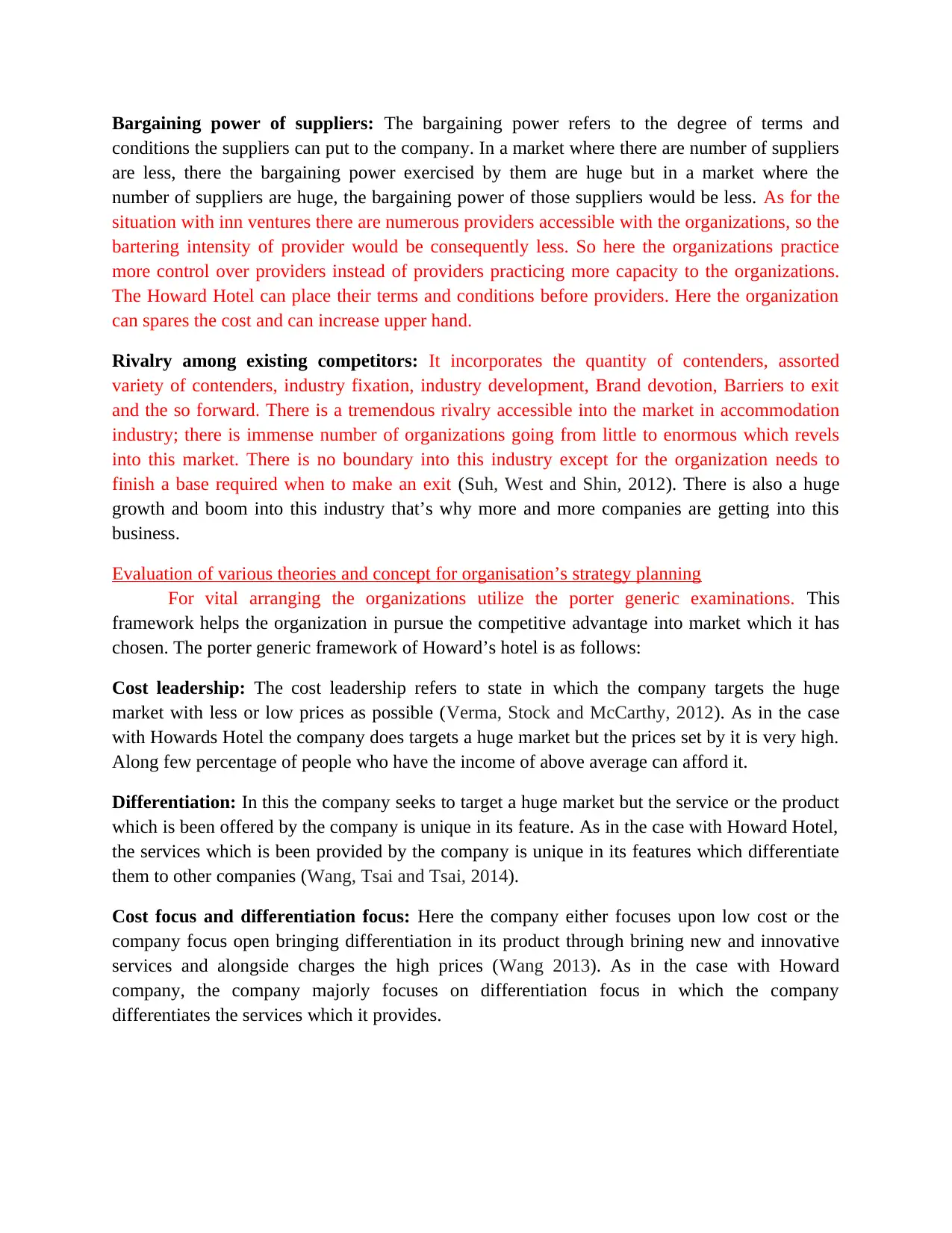
Bargaining power of suppliers: The bargaining power refers to the degree of terms and
conditions the suppliers can put to the company. In a market where there are number of suppliers
are less, there the bargaining power exercised by them are huge but in a market where the
number of suppliers are huge, the bargaining power of those suppliers would be less. As for the
situation with inn ventures there are numerous providers accessible with the organizations, so the
bartering intensity of provider would be consequently less. So here the organizations practice
more control over providers instead of providers practicing more capacity to the organizations.
The Howard Hotel can place their terms and conditions before providers. Here the organization
can spares the cost and can increase upper hand.
Rivalry among existing competitors: It incorporates the quantity of contenders, assorted
variety of contenders, industry fixation, industry development, Brand devotion, Barriers to exit
and the so forward. There is a tremendous rivalry accessible into the market in accommodation
industry; there is immense number of organizations going from little to enormous which revels
into this market. There is no boundary into this industry except for the organization needs to
finish a base required when to make an exit (Suh, West and Shin, 2012). There is also a huge
growth and boom into this industry that’s why more and more companies are getting into this
business.
Evaluation of various theories and concept for organisation’s strategy planning
For vital arranging the organizations utilize the porter generic examinations. This
framework helps the organization in pursue the competitive advantage into market which it has
chosen. The porter generic framework of Howard’s hotel is as follows:
Cost leadership: The cost leadership refers to state in which the company targets the huge
market with less or low prices as possible (Verma, Stock and McCarthy, 2012). As in the case
with Howards Hotel the company does targets a huge market but the prices set by it is very high.
Along few percentage of people who have the income of above average can afford it.
Differentiation: In this the company seeks to target a huge market but the service or the product
which is been offered by the company is unique in its feature. As in the case with Howard Hotel,
the services which is been provided by the company is unique in its features which differentiate
them to other companies (Wang, Tsai and Tsai, 2014).
Cost focus and differentiation focus: Here the company either focuses upon low cost or the
company focus open bringing differentiation in its product through brining new and innovative
services and alongside charges the high prices (Wang 2013). As in the case with Howard
company, the company majorly focuses on differentiation focus in which the company
differentiates the services which it provides.
conditions the suppliers can put to the company. In a market where there are number of suppliers
are less, there the bargaining power exercised by them are huge but in a market where the
number of suppliers are huge, the bargaining power of those suppliers would be less. As for the
situation with inn ventures there are numerous providers accessible with the organizations, so the
bartering intensity of provider would be consequently less. So here the organizations practice
more control over providers instead of providers practicing more capacity to the organizations.
The Howard Hotel can place their terms and conditions before providers. Here the organization
can spares the cost and can increase upper hand.
Rivalry among existing competitors: It incorporates the quantity of contenders, assorted
variety of contenders, industry fixation, industry development, Brand devotion, Barriers to exit
and the so forward. There is a tremendous rivalry accessible into the market in accommodation
industry; there is immense number of organizations going from little to enormous which revels
into this market. There is no boundary into this industry except for the organization needs to
finish a base required when to make an exit (Suh, West and Shin, 2012). There is also a huge
growth and boom into this industry that’s why more and more companies are getting into this
business.
Evaluation of various theories and concept for organisation’s strategy planning
For vital arranging the organizations utilize the porter generic examinations. This
framework helps the organization in pursue the competitive advantage into market which it has
chosen. The porter generic framework of Howard’s hotel is as follows:
Cost leadership: The cost leadership refers to state in which the company targets the huge
market with less or low prices as possible (Verma, Stock and McCarthy, 2012). As in the case
with Howards Hotel the company does targets a huge market but the prices set by it is very high.
Along few percentage of people who have the income of above average can afford it.
Differentiation: In this the company seeks to target a huge market but the service or the product
which is been offered by the company is unique in its feature. As in the case with Howard Hotel,
the services which is been provided by the company is unique in its features which differentiate
them to other companies (Wang, Tsai and Tsai, 2014).
Cost focus and differentiation focus: Here the company either focuses upon low cost or the
company focus open bringing differentiation in its product through brining new and innovative
services and alongside charges the high prices (Wang 2013). As in the case with Howard
company, the company majorly focuses on differentiation focus in which the company
differentiates the services which it provides.
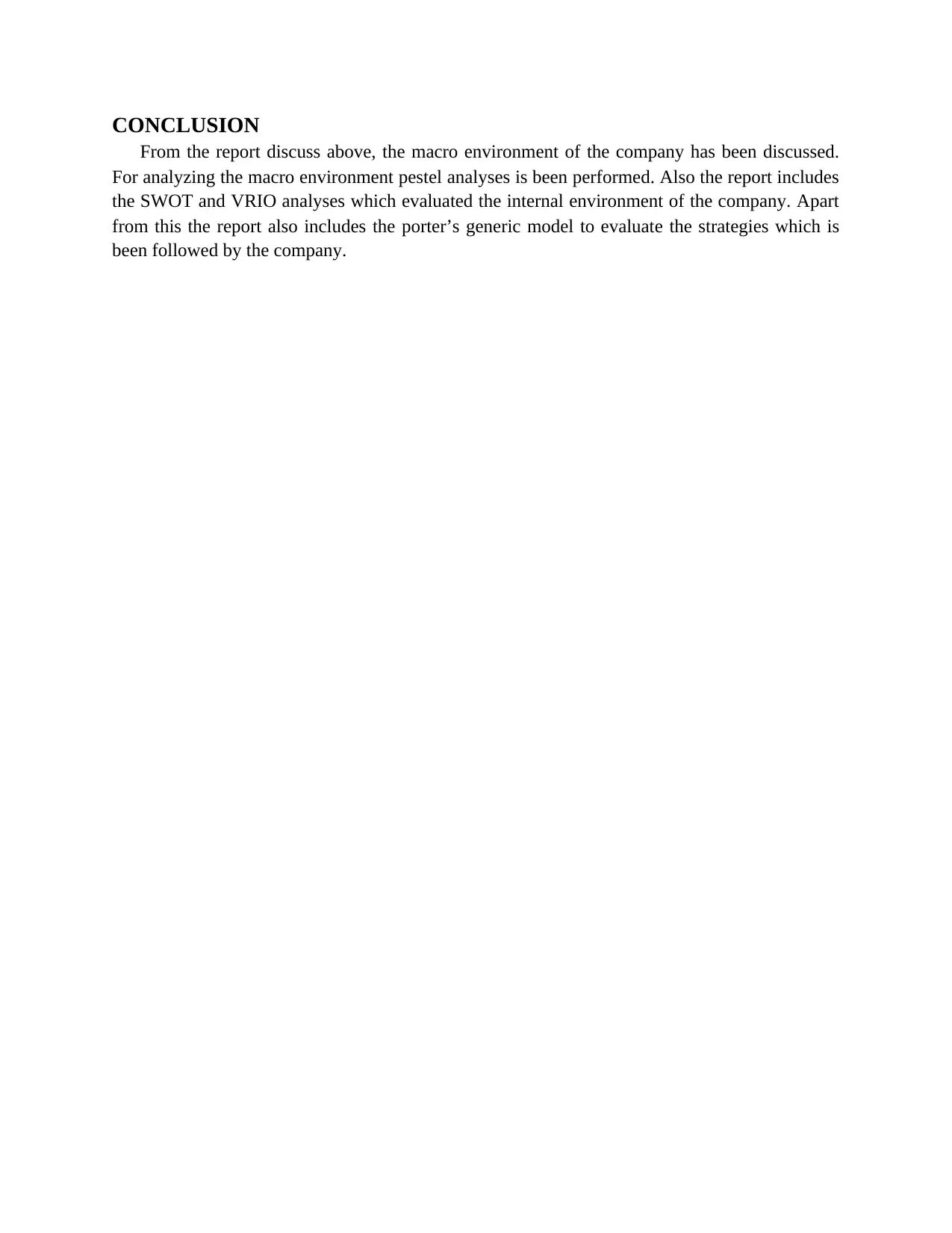
CONCLUSION
From the report discuss above, the macro environment of the company has been discussed.
For analyzing the macro environment pestel analyses is been performed. Also the report includes
the SWOT and VRIO analyses which evaluated the internal environment of the company. Apart
from this the report also includes the porter’s generic model to evaluate the strategies which is
been followed by the company.
From the report discuss above, the macro environment of the company has been discussed.
For analyzing the macro environment pestel analyses is been performed. Also the report includes
the SWOT and VRIO analyses which evaluated the internal environment of the company. Apart
from this the report also includes the porter’s generic model to evaluate the strategies which is
been followed by the company.
⊘ This is a preview!⊘
Do you want full access?
Subscribe today to unlock all pages.

Trusted by 1+ million students worldwide
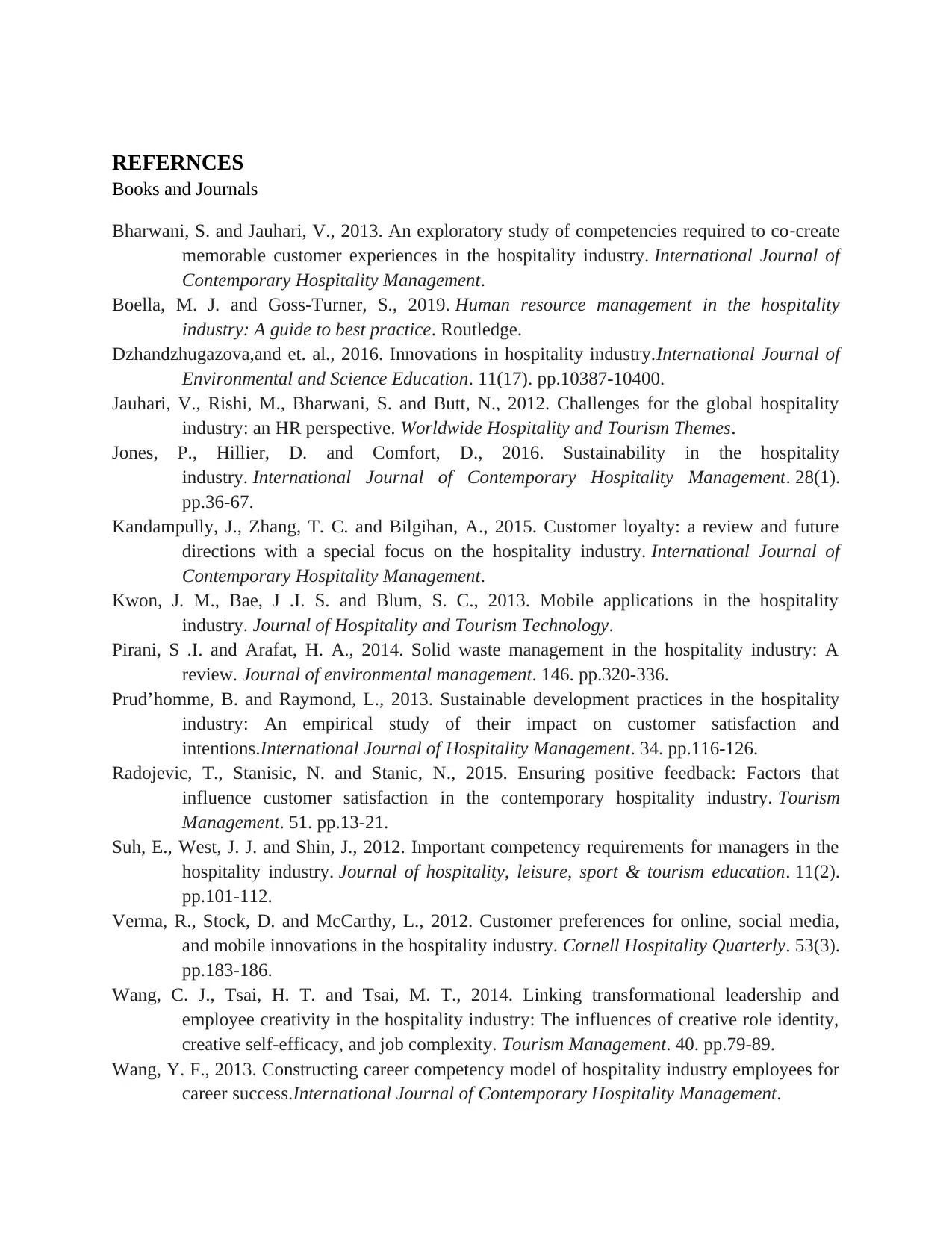
REFERNCES
Books and Journals
Bharwani, S. and Jauhari, V., 2013. An exploratory study of competencies required to co‐create
memorable customer experiences in the hospitality industry. International Journal of
Contemporary Hospitality Management.
Boella, M. J. and Goss-Turner, S., 2019. Human resource management in the hospitality
industry: A guide to best practice. Routledge.
Dzhandzhugazova,and et. al., 2016. Innovations in hospitality industry.International Journal of
Environmental and Science Education. 11(17). pp.10387-10400.
Jauhari, V., Rishi, M., Bharwani, S. and Butt, N., 2012. Challenges for the global hospitality
industry: an HR perspective. Worldwide Hospitality and Tourism Themes.
Jones, P., Hillier, D. and Comfort, D., 2016. Sustainability in the hospitality
industry. International Journal of Contemporary Hospitality Management. 28(1).
pp.36-67.
Kandampully, J., Zhang, T. C. and Bilgihan, A., 2015. Customer loyalty: a review and future
directions with a special focus on the hospitality industry. International Journal of
Contemporary Hospitality Management.
Kwon, J. M., Bae, J .I. S. and Blum, S. C., 2013. Mobile applications in the hospitality
industry. Journal of Hospitality and Tourism Technology.
Pirani, S .I. and Arafat, H. A., 2014. Solid waste management in the hospitality industry: A
review. Journal of environmental management. 146. pp.320-336.
Prud’homme, B. and Raymond, L., 2013. Sustainable development practices in the hospitality
industry: An empirical study of their impact on customer satisfaction and
intentions.International Journal of Hospitality Management. 34. pp.116-126.
Radojevic, T., Stanisic, N. and Stanic, N., 2015. Ensuring positive feedback: Factors that
influence customer satisfaction in the contemporary hospitality industry. Tourism
Management. 51. pp.13-21.
Suh, E., West, J. J. and Shin, J., 2012. Important competency requirements for managers in the
hospitality industry. Journal of hospitality, leisure, sport & tourism education. 11(2).
pp.101-112.
Verma, R., Stock, D. and McCarthy, L., 2012. Customer preferences for online, social media,
and mobile innovations in the hospitality industry. Cornell Hospitality Quarterly. 53(3).
pp.183-186.
Wang, C. J., Tsai, H. T. and Tsai, M. T., 2014. Linking transformational leadership and
employee creativity in the hospitality industry: The influences of creative role identity,
creative self-efficacy, and job complexity. Tourism Management. 40. pp.79-89.
Wang, Y. F., 2013. Constructing career competency model of hospitality industry employees for
career success.International Journal of Contemporary Hospitality Management.
Books and Journals
Bharwani, S. and Jauhari, V., 2013. An exploratory study of competencies required to co‐create
memorable customer experiences in the hospitality industry. International Journal of
Contemporary Hospitality Management.
Boella, M. J. and Goss-Turner, S., 2019. Human resource management in the hospitality
industry: A guide to best practice. Routledge.
Dzhandzhugazova,and et. al., 2016. Innovations in hospitality industry.International Journal of
Environmental and Science Education. 11(17). pp.10387-10400.
Jauhari, V., Rishi, M., Bharwani, S. and Butt, N., 2012. Challenges for the global hospitality
industry: an HR perspective. Worldwide Hospitality and Tourism Themes.
Jones, P., Hillier, D. and Comfort, D., 2016. Sustainability in the hospitality
industry. International Journal of Contemporary Hospitality Management. 28(1).
pp.36-67.
Kandampully, J., Zhang, T. C. and Bilgihan, A., 2015. Customer loyalty: a review and future
directions with a special focus on the hospitality industry. International Journal of
Contemporary Hospitality Management.
Kwon, J. M., Bae, J .I. S. and Blum, S. C., 2013. Mobile applications in the hospitality
industry. Journal of Hospitality and Tourism Technology.
Pirani, S .I. and Arafat, H. A., 2014. Solid waste management in the hospitality industry: A
review. Journal of environmental management. 146. pp.320-336.
Prud’homme, B. and Raymond, L., 2013. Sustainable development practices in the hospitality
industry: An empirical study of their impact on customer satisfaction and
intentions.International Journal of Hospitality Management. 34. pp.116-126.
Radojevic, T., Stanisic, N. and Stanic, N., 2015. Ensuring positive feedback: Factors that
influence customer satisfaction in the contemporary hospitality industry. Tourism
Management. 51. pp.13-21.
Suh, E., West, J. J. and Shin, J., 2012. Important competency requirements for managers in the
hospitality industry. Journal of hospitality, leisure, sport & tourism education. 11(2).
pp.101-112.
Verma, R., Stock, D. and McCarthy, L., 2012. Customer preferences for online, social media,
and mobile innovations in the hospitality industry. Cornell Hospitality Quarterly. 53(3).
pp.183-186.
Wang, C. J., Tsai, H. T. and Tsai, M. T., 2014. Linking transformational leadership and
employee creativity in the hospitality industry: The influences of creative role identity,
creative self-efficacy, and job complexity. Tourism Management. 40. pp.79-89.
Wang, Y. F., 2013. Constructing career competency model of hospitality industry employees for
career success.International Journal of Contemporary Hospitality Management.
Paraphrase This Document
Need a fresh take? Get an instant paraphrase of this document with our AI Paraphraser
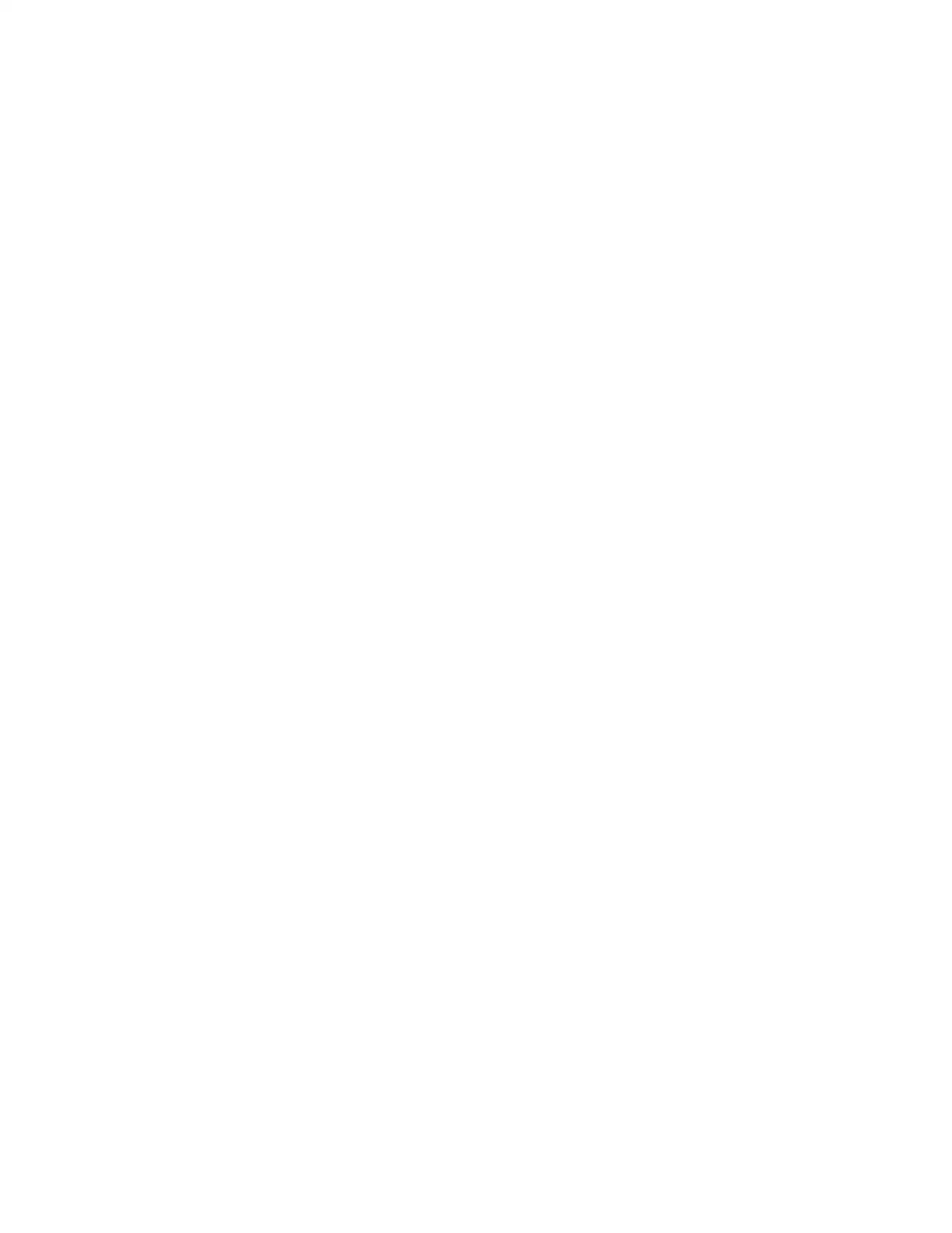
1 out of 11
Related Documents
Your All-in-One AI-Powered Toolkit for Academic Success.
+13062052269
info@desklib.com
Available 24*7 on WhatsApp / Email
![[object Object]](/_next/static/media/star-bottom.7253800d.svg)
Unlock your academic potential
Copyright © 2020–2026 A2Z Services. All Rights Reserved. Developed and managed by ZUCOL.




